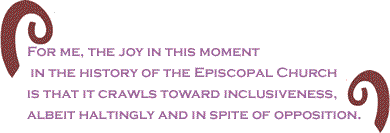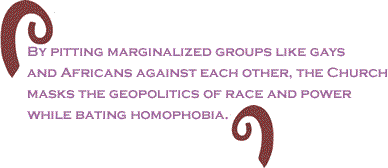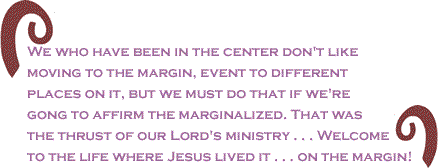
|
|||||||||||||||||||||||

|
|

Custom Search
|
|
 |
|
The House of Bishops of the Episcopal Church voted overwhelmingly to overturn a three-year moratorium on the election of lesbian, gay, bisexual, transgender and queers to the episcopate. While many LGBTQ Episcopalians and their allies are jumping for joy, the battle isn’t over. But the Archbishop of Canterbury Dr Rowan Williams expressed his concerns about the recent vote telling the Associated Press "I regret the fact that there is no will to observe the moratorium in such a significant part of the church in North America." The conservative arm of the Episcopal Church suggests that the openly-gay Bishop of New Hampshire, the Rev. V. Gene Robinson, should resign to avoid disintegration of the Anglican Communion. But is the Episcopal Church's impeding schism really about the theological rift that sprung up after the consecration of its first openly-gay bishop? Or, is the brouhaha really about a church in battle with itself about how to be financially solvent and theologically relevant in today's competitive religious marketplace? And those who argue about the “authority of Scripture” doesn’t hold weight here because the Episcopal Church has always been challenged on this issue. For example, in the 1970s, the argument for authority of Scripture came up with the ordination of women – and so, too, did the threat of a schism. But in 1989, the Church consecrated its first female bishop – Barbara C. Harris. And conservatives were not only theologically outraged, but also racially challenged because Harris is African American.
And in 2006, gasps of both exhilaration and exasperation reverberated throughout the Anglican Communion when it was announced that Katharine Jefferts Schori would be the Presiding Bishop of the Episcopal Church USA. All this is no surprise, however, since the Episcopal Church has a history of taking the moral high ground on social justice issues. On the theological rift concerning American slavery, the Episcopal Church rebuked the Bible’s literal interpretation, arguing that slavery violated the spirit of the Bible. Boston's Old North Church, which played an active role in the American Revolution, served as a beacon for Paul Revere’s “midnight ride.” The Emmanuel Episcopal Church in Cumberland, Md., was a major stop on the Underground Railroad. While many would like to believe that secessionist congregations battling with liberal bishops endorsing "sodomy" brought on the financial crisis in the Episcopal Church, the church's coffers were bare prior to Robinson’s consecration. And the reason? Decline in its membership over four decades; the rise of its Third World bishops from countries in Africa, South America, and Asia; and its egregious act of inhospitality and exclusion of its LGBTQ population. The tension that currently exists inside the worldwide Anglican Communion is undeniable. But what many don't realize is that it is as much about how its unforeseen legacy of unbridled missionary efforts expanded into the Third World as it is about the conservative arm of the Church repudiating homosexuality. But the two feed off each other with Robinson since his consecration being the Church's scapegoat. By pitting marginalized groups like gays and Africans against each other, the Church masks the geopolitics of race and power while bating homophobia. Does this scenario sound familiar? When the liberal wing of the ECUSA consecrated Robinson, the Anglican's Global South - comprised mostly of Third World countries in Africa, South America, and Asia - did not embrace the Church's radical shift from a religion of personal transformation to a faith of personal affirmation. For the Global South, that shift raised not only questions about theological belief, but also about their ecclesiastical power within the Church. With centuries of Anglican missionaries traversing worldwide into the hinterlands and jungles of Third World countries to transform heathens of indigenous religions and fertility cult practices into good Christians, its globetrotting evangelizing carried not only racist and homophobic messages that had strong theological holds on its colonial subjects, but it also brought the notion of power to disenfranchised countries that wanted in the Anglican ecclesiastical fiefdom. One sign of entry is an invitation to Lambeth conferences. They are once-a-decade global gatherings of Anglican archbishops and bishops that once upon a time functioned as the Church's only white male club of heterosexual power brokers. They ignored, without moral compunction, its missionary churches. But things changed. And when they did, they changed not only radically but also racially. "In 10 years, when African bishops come to the microphone at this conference, we will be so numerous and influential that you will have to recognize us," said Joseph Adetiloye, a retired official with the church in Nigeria, at the 1978 Lambeth Conference, according to The New Yorker. While the U.S has, at best, approximately 2.2 Episcopalians today, the center of Anglican gravity is neither here nor in Britain, but in Africa. There are approximately three million in Kenya, and nine million in Uganda. But those two countries combined do not come close to the 20 million in Nigeria, making Peter Akinola, the archbishop there, one of the most influential men in the Anglican Communion.
A vociferous opponent of LGBTQ civil rights, Akinola has used Robinson as his whipping boy to flex his muscle as a sign of African power in the Anglican Church as well as to expand his missionary power by capitalizing on the theological schism that has developed. Robinson is now a lone voice in the wilderness among bishops. And it's also a way for the Church to avoid addressing its heterosexism head on. I remember the preacher at Robinson's consecration. He was the Rt. Rev. Douglas E. Theuner who was succeeded by Robinson. Theuner preached about the necessary shift that must take place in the church in order for it to be inclusive of all people, not just with LGBTQ people. He said:
For me, the joy in this moment in the history of the Episcopal Church is that it crawls toward inclusiveness, albeit haltingly and in spite of opposition. And for those of us on the margins in our churches and faith communities we need to see the principle of love in action. The House of Bishops has voted. And let the Episcopal Church say Amen. BlackCommentator.com Editorial Board member, the Rev. Irene Monroe, is a religion columnist, theologian, and public speaker. A native of Brooklyn, Rev. Monroe is a graduate from Wellesley College and Union Theological Seminary at Columbia University, and served as a pastor at an African-American church before coming to Harvard Divinity School for her doctorate as a Ford Fellow. Reverend Monroe is the author of Let Your Light Shine Like a Rainbow Always: Meditations on Bible Prayers for Not-So-Everyday Moments. As an African American feminist theologian, she speaks for a sector of society that is frequently invisible. Her website is irenemonroe.com. Click here to contact the Rev. Monroe. |
|
Any BlackCommentator.com article may be re-printed so long as it is re-printed in its entirety and full credit given to the author and www.BlackCommentator.com. If the re-print is on the Internet we additionally request a link back to the original piece on our Website. Your comments are always welcome. eMail re-print notice
If you send us an eMail message we may publish all or part of it, unless you tell us it is not for publication. You may also request that we withhold your name. Thank you very much for your readership. |
|
| |
|
| July
16, 2009 Issue 333 |
|
| Executive Editor: Bill Fletcher, Jr. |
| Managing Editor: Nancy Littlefield |
| Publisher: Peter Gamble |
| Est. April 5, 2002 |
Printer Friendly Version
in resizeable plain
text format or pdf
format. |
| Frequently Asked Questions |
 |

|
 |
 |
 |
| |
| |






































